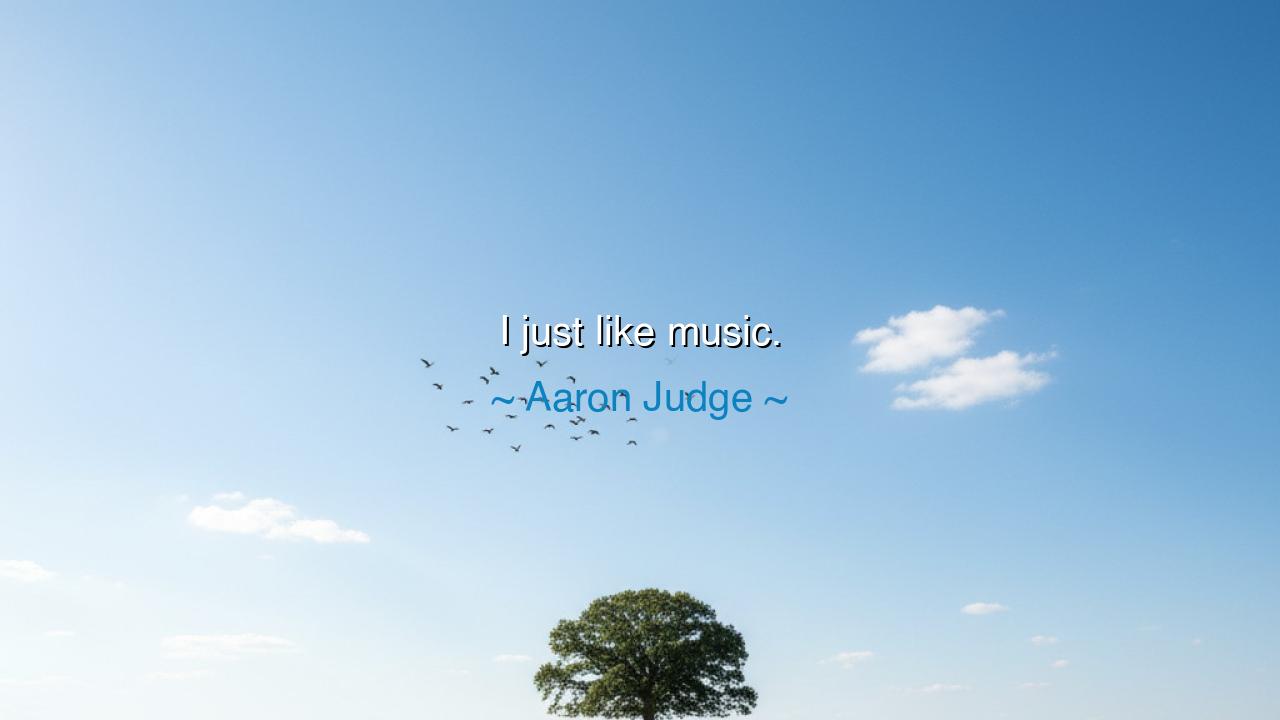
I just like music.






The words of Aaron Judge may seem simple, almost childlike in their brevity: “I just like music.” Yet within this simplicity lies a profound and eternal truth. For sometimes the deepest wisdom is not spoken in grand declarations, but in plain words that reveal the heart. To like music is not merely to enjoy sound, but to recognize a universal force that stirs every soul, across every age and every culture. Judge’s words remind us that in the end, music requires no justification—it is enough to love it, for in that love we find connection to the whole of humanity.
The ancients knew this truth well. Pythagoras, the philosopher of Greece, spoke of the music of the spheres, declaring that the movements of the heavens themselves were bound together by harmony. In temples, in villages, in battlefields, and in festivals, music was always present. To say “I like music” is to align oneself with a lineage as old as the stars, for music has forever been the companion of life—carrying joy, sorrow, worship, and memory. It is not merely a preference, but an instinct woven into our very being.
Consider the story of King David, shepherd and poet, who played the harp in his youth. When King Saul was troubled by dark spirits, it was David’s music that brought him peace. David did not need to explain why he played—he played because music brought life, and that was reason enough. Judge’s words echo this same humility: there is no need for lofty explanation when love for music already holds its power in the heart.
So too do we see this in the life of common people throughout history. The enslaved in America, broken by chains and toil, still sang. Their spirituals carried hope, resistance, and endurance. They did not sing for fame, nor for grandeur, but because “they liked music”—because in music they found survival. Here we see the fullness of Judge’s words: music does not always serve ambition; often it simply serves the soul.
In Judge’s declaration there is also freedom. In a world where everything is often measured, monetized, and explained, he reminds us that some things need no reason beyond joy itself. To just like music is to embrace it without burden, without analysis, without demand. It is to give the heart permission to delight in beauty for its own sake. This is not small—it is liberation. For when we learn to enjoy things simply, we learn to live more fully.
O listener, take this as a lesson: not everything in life must serve a grand purpose to be valuable. If music brings you joy, let it. If art stirs your heart, honor it. Do not always ask why you love something—sometimes the love itself is the answer. To delight in simple things is to taste eternity in the everyday. To say, “I just like music,” is to admit that beauty needs no defense.
Practical wisdom follows: make time for what you simply like. Fill your days with music, with art, with things that stir joy, even if the world cannot measure their worth. Share them with others, not as achievements, but as gifts. And when life grows heavy, remember that music—like breath—exists to lighten, to heal, to remind us of our humanity.
Thus, remember Aaron Judge’s words: to like music is enough. In that liking is hidden all the history of human song, all the healing of the heart, all the harmony of creation. Do not seek to explain away joy. Simply live it, and let it carry you as it has carried countless generations before you.






AAdministratorAdministrator
Welcome, honored guests. Please leave a comment, we will respond soon